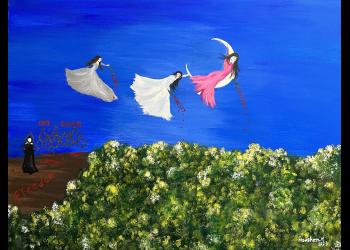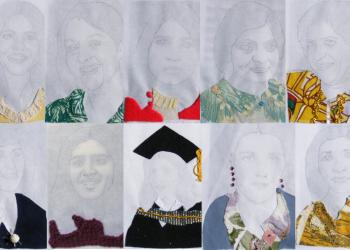#OurStoryIsOne campaign gathers momentum
Persian translation
The Baha’i International Community (BIC) is today launching the intensive phase of the Our Story Is One campaign, announcing a new dedicated website and Instagram page. #OurStoryIs One” is a global campaign marking the 40th anniversary of the execution of 10 Baha’i women in Shiraz, Iran, who were hanged for their belief in a faith that promotes gender equality, justice and truthfulness. The executions prompted a global wave of support for the persecuted Iranian Baha’i community.
The campaign has dedicated this anniversary to all women in Iran, regardless of faith and background, who have contributed to the long struggle for gender equality, calling for artistic content to honor the 10 as well as all the women in Iran.
Following their arrests, and for six months prior to their execution, the 10 women faced brutal interrogations, torture, and ill treatment in an effort to force them to recant their faith. They were asked to choose between their beliefs or their lives. They chose to stand for equality and justice.
“The arduous path to gender equality in Iran has been walked by countless women over the decades. That road has been marked by the sacrifices of those who chose to stand for their principles even over their lives,” says Simin Fahandej, the Baha’i International Community Representative to the United Nations in Geneva.
“We call on officials, civil society organizations, prominent individuals, celebrities and the public to join the campaign, in contributions however small or large, to honor all women in Iran.”
A new section of the Archives of Baha’i Persecution in Iran website has also been created to collect all available documents about the 10 women, including, to show just some examples, letters to their families, including some written from inside prison, personal photos, prison documents and other archival materials.
Contributions have already begun pouring in, with some individuals sharing them directly online, while others send them to the campaign email address at [email protected]. The creative contributions have included songs, podcasts, paintings, poems, graphic art, tapestry and many other forms of support, honoring the 10 women and all women in Iran.
“We are deeply moved by the level of support already seen for the campaign,” adds Ms. Fahandej. “The support shows that the unified call to view the struggle of Iranian women for gender equality as part of the same story that resonates with all. We are all deeply interconnected, our story is linked, and we are walking the same path towards the shared value of gender equality, which has become one of the most prominent causes in Iran today. The story of the 10 Baha’i women was a chapter in the unfolding story of Iranian women’s resilience and sacrifice for equality. Today, in the blood, tears and wounds of thousands of young women in Iran seeking equality, we can see echoes of the injustice suffered by the 10 women of Shiraz whose tragic death touched the lives of many.”
In a podcast interview by British personality Russell Brand with Iranian-British comedian Omid Djalili, broadcast to Brand’s 11 million followers, the pair discussed the legacy of the 10 Baha’i women in Shiraz.
Djalili, who said that when the hangings happened, it “totally shocked me to my core,” told Brand that the 10 women had been asked to recant their beliefs, or to “lie about wanting a better world” and about “believing in the equality of men and women,” but that each of them had refused. He added that they “gave up their lives for an idea … they will put their lives on the line” rather than lie about their beliefs. Their story, he said, has “inspired” today’s women to walk the same path.
Songs are also being produced by professional singers in different countries and in different languages with the message that “our story is one”.
Memorial events are also being organized in countries and regions around the world. A high-level international event will be held in London on 21 June featuring United Nations officials, international civil society organizations, leading human rights advocates, government officials and the media. Three Baha’i Houses of Worship—or temples—will hold major events in Australia, Germany and the United States with officials, dignitaries, and the media. In Sweden, the Deputy Mayor of Stockholm, Anders Österberg, is co-organizing a memorial event together with the country’s Baha’i community at Stockholm City Hall, the venue of the Nobel Prize banquet.
Young people around the world have been inspired by the story of the 10 and the women of Iran and their commitment to stand up for their beliefs. A youth group in Austria, for example, is producing a choral piece, while other youth in the country are preparing a new song about the 10 women. Young people in Chile have been performing a theater piece they produced about the lives of the 10 women and will perform the piece for more groups including government officials, civil society organizations and prominent individuals. In Australia, a First Nations community is planning contributions to the campaign in honor of the 10, as are people in neighborhoods where gender equality is a relevant topic for their community. In several other countries, works of art and music are being prepared.
Documentary films are also being produced about the women by prominent news outlets as well as short videos which will be aired on 18 June.
One of the songs in Persian has powerful lyrics stating: “Our story is one/the story of dancing despite pain/scattering the seeds of flowers and overcoming oppression.” Among the contributions already made are also a video about the women, many paintings, for example a work depicting the women being carried after execution by “freedom, equality and unity”, numerous poems, graphic art, tapestries and pencil traces of the women, a song over calligraphy and other examples.
The campaign continues for one year, calling for artistic contributions throughout the next 12 months. Its most intensive phase begins now and will last during June when posts and contributions will be made every day, culminating in a Twitter storm on 18 June.
“We call on everyone to join the campaign and show that we will walk together in our efforts to achieve gender equality in Iran,” Ms. Fahandej adds. “Contributions can include songs about the 10 women, short videos about their lives, memories about the women themselves, graphic arts, written work, social media posts, or public events and memorials, to honor the longstanding struggle and efforts towards gender equality in Iran.
“The moving stories of these 10 women, and every woman in Iran, are galvanizing us all to honor their memory wherever we are, in however humble or significant artistic contributions or statements of support. Let us jointly stand with them and show that we are inextricably linked regardless of faith and background and that we will make our voices heard until our shared ideals are realized.”
Background
On 18 June 1983, 10 Baha'i women, most of them in their 20s, including a young girl of 17 and a woman in her 50s, were executed by hanging in Chowgan Square in Shiraz because they had refused to renounce their faith. This shocking event was met with consternation and outrage by human rights groups and ordinary people around the world.
Two nights prior, six Baha’i men (some of them relatives of these 10 women) were executed in that same square. More than 200 Baha’is were executed by the Iranian authorities in the years after the 1979 Islamic Revolution. The killings only paused after international outcries, but the persecution of the Baha’is in Iran continues with impunity to this day.
The 10 women were arrested in October and November 1982. Many were first held at the Sepah Detention Centre and then transferred to Adelabad Prison. They suffered harsh interrogations and torture by Revolutionary Guards in an attempt to coerce them to recant their faith. They were denied the right to a lawyer, denied a trial in a public court, and ultimately sentenced by the Sharia judge of Shiraz to execution by hanging on charges of “Zionism,” “spying for Israel,” and teaching moral education classes for children.
Each of these women was violently coerced several times in the effort to get them to deny their faith and to convert to Islam, to escape execution, but none of them agreed to sign the statements authorities prepared for them. On 18 June 1983, they were secretly taken to Chowgan Square and hanged one by one and in front of each other. Their families were not even notified of their deaths, their bodies were not returned to their families, and they did not receive dignified burials with religious rites. It is believed that they were buried in the Baha'i cemetery in Shiraz by the authorities, which was later demolished and made into a “cultural and sports building” in 2014.
The women executed on this date were:
-
Mona Mahmoudnejad, 17;
-
Roya Eshraghi, 23, executed along with her mother Ezzat-Janami Eshraghi;
-
Simin Saberi, 24;
-
Akhtar Sabet, 25;
-
Mahshid Niroumand, 28;
-
Tahereh Arjomandi Siyavashi, 30. Her husband, Jamshid Siavashi, was executed two days earlier;
-
Nosrat Ghufrani Yaldaie, 46. Her son, Bahram Yaldaie, was executed two days earlier;
-
Ezzat-Janami Eshraghi, 57, along with her daughter Roya, 23. Her husband, Enayatullah Eshraghi was executed two days earlier.







